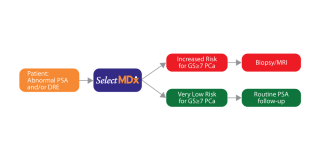During the biopsy, a sample of prostate tissue is removed and then examined under a microscope to determine if cancer cells are present in your prostate.
* On its own, elevated PSA does not indicate the need for prostate biopsy. Read about the PCA3 test for more information.
What is TRUS-guided prostate biopsy?
TRUS stands for “trans-rectal ultrasound”. In order to locate the prostate within the body, we use ultrasound imaging. Sample images below show both a normal prostate and one with prostate cancer. These ultrasound images help the physician to see where to place the needle during a prostate biopsy.

How to prepare for the TRUS-guided prostate biopsy
- Let us know if you take any anti-coagulants such as coumadin or warfarin, or have a history of bleeding disorders
- 10 days before your biopsy, stop taking aspirin, all blood-thinning and arthritis medications; you may still take Tylenol for pain relief
- To prevent infection, start taking antibiotics the day before the biopsy and continue them for a few days after the procedure
- The night before your biopsy, either use Rectal Fleet Enema or take an Oral Dulcolax tablet with water (not milk) to prepare rectum for the ultrasound probe
- You can continue eating and drinking normally
What happens during the biopsy?
Prostate biopsy is performed under local anesthesia as an outpatient procedure.
During the biopsy, multiple tissue samples, known as cores, will be obtained from different regions of the prostate to ensure that the diagnosis and cancer staging is accurate.
The entire procedure takes approximately 20 minutes, and the results will be completed in approximately 2 weeks.
What happens after the biopsy?
After your biopsy, you will spend an hour at the clinic to make sure there are no complications.
Activities
In most cases you can return to your normal routine the same day. Avoid sexual activity for 24 hours.
Pain Relief
The biopsy site may be sore for a few days after the procedure. We will recommend a pain reliever that is safe and will not increase a chance of bleeding. Avoid aspirin and other blood-thinning medications.
Bleeding
You will see some blood in your urine, stool, or ejaculate. This is normal and will usually resolve on its own in 2 to 4 weeks after the biopsy.
A small number of patients experience infection or have trouble urinating. Go to your closest emergency department immediately if you experience any of the following:
- Significant bleeding
- Abdominal or pelvic pain
- Trouble urinating or burning when urinating
- Chills, fever, shaking
Most biopsies are simple, straightforward procedures. Once yours is finished, you can relax and take it easy for the day.




